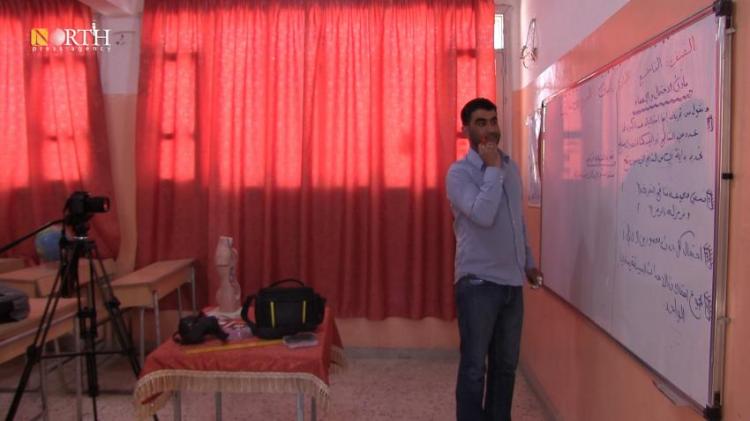Raqqa – North-Press Agency
Ahmed al-Hassan
The Education Committee of the Raqqa Civil Council recently launched a project to educate students remotely, more than a month after the suspension of school hours and the imposition of the lockdown in the region.
On March 14, the Autonomous Administration of North and East Syria decided to suspend working hours in all schools, institutes, and universities until further notice, in order to counter the threat of the spread of the coronavirus epidemic.
Recorded lessons
The Education Committee has equipped Rabaa al-Adawiya School in the city of Raqqa and provided it with the necessary technical devices to record lessons in all study materials that are broadcast on television channels and on social media networks to ensure the continuing education of students and the resumption of scheduled lessons that they did not receive in schools this year.
Khalaf al-Matar, head of the Education Committee in the city of Raqqa, told North-Press that after suspending school hours, the Education Committee of the Raqqa Civil Council has started preparing lessons to be delivered to students either on television or on social media.
The new educational program, which is prepared by teachers from the city of Raqqa, targets the various educational stages starting from the fourth grade to the 12th grade, where lessons are prepared, and then broadcasted, with the aim of reaching the largest possible number of students.
Riyad al-Marai, a teacher from the Education Committee in the city of Raqqa and a participant in the distance education program, told North-Press that they are keen to prepare the lessons and explain them in detail in front of the camera.
Obstacles for students
As for Ayham al-Khaled, a 9th grade student in al-Qahtaniyah farm, 5 km west of the city of Raqqa, summarized his view on this educational method by saying: "Half a loaf is better than no bread."
He explained that "when schools were closed, I was disappointed, because most of the lessons of the second semester we did not take in school, so I have difficulty understanding them, especially the scientific subjects."
The problem of bad internet network is one of the most prominent obstacles that accompany distance education, because most students intend to receive lessons on social network sites using smart phones, while television broadcasting is less beneficial due to the students inability to adapt to watching the lessons they reached during their studies at home and in the available time to them.
The risks of the spread of coronavirus have removed 789,225 students from their schools in all areas of northeastern Syria, as 4,137 schools were closed, according to the Education Committee of the Autonomous Administration.

